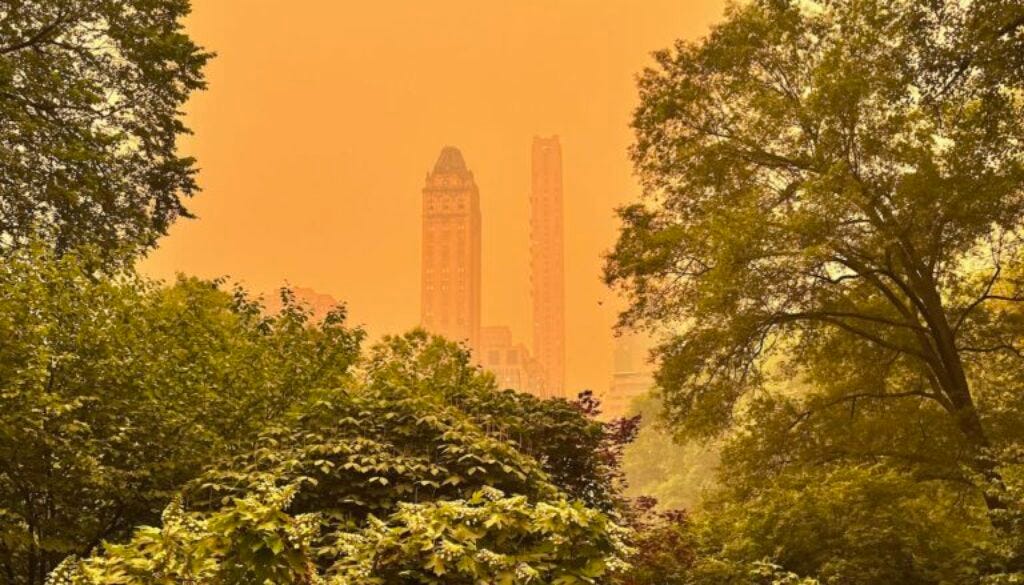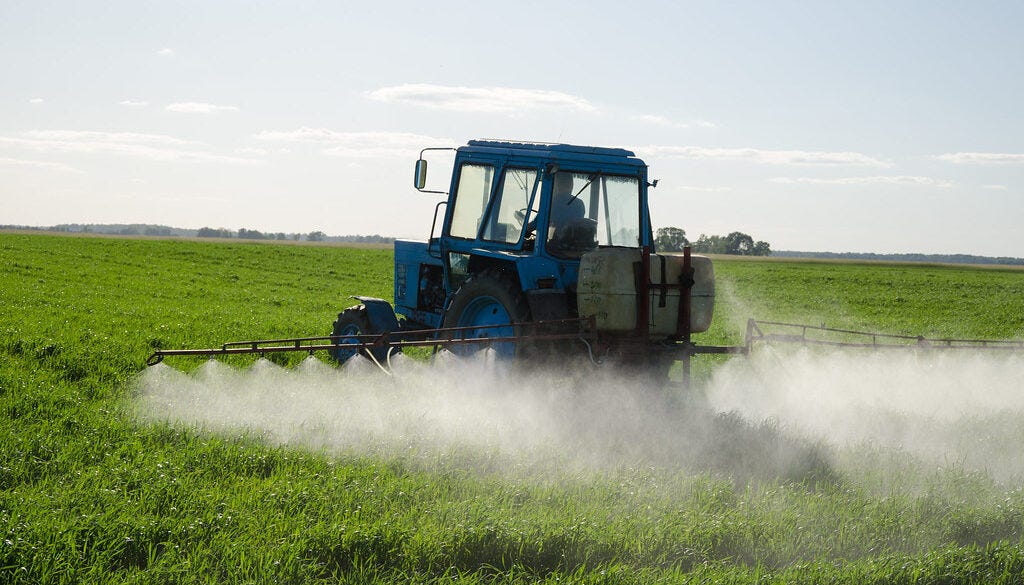Must-read recap: The New Lede's top stories
Wildfire smoke clears in Northeast but air quality impacts may return; warming to surpass Paris Agreement limit by 2037; advocacy groups sue EPA over weed killer reapprovals; 3M PFAS trial delayed.
As wildfire smoke clears, scientists warn air quality impacts aren’t over
On Tuesday morning, Austin Channell was starting his day at home in Hudson, New York when he discovered the rays of sunlight on his wall were an odd orangey pink. As the day progressed, the sky grew stranger.
“By the afternoon we couldn’t see the sun at all,” said Channell, who works as the events director for an aviation museum.
The rest of the week, Channell described feeling a sense of helplessness as smoke from Canadian wildfires enveloped the northeastern US, bringing hazardously high air pollution levels to millions of people. On Wednesday, New York City’s air quality index (AQI) reached a staggering 460 – the highest level of air pollution recorded in the city since measurements began in 1999 and more than an order of magnitude higher than the safe daily average of 35 set by the Environmental Protection Agency (EPA). Dangerous air pollution levels were also detected in Philadelphia and Washington, DC.
After a few hazardous days, the region’s air quality has improved. But meteorologists warn that smoke may return to northeastern skies this summer as Canadian wildfires rage on. While frequent and more intense wildfires bolstered by the warming climate have become a frightening new normal for the American West, scientists say smoke from burning forests will continue to have far-reaching air quality impacts. (Read the rest of the story.)
Human-caused warming to surpass Paris Agreement limit by 2037, analysis finds
Human-caused global warming is set to surpass 2.7° Fahrenheit (1.5° Celsius) by the year 2037, overshooting an international goal beyond which severe climate disruptions may become the norm, according to a new analysis from 50 climate scientists.
“This is unprecedented in anything we have seen historically,” said Piers Forster, a professor at the University of Leeds and an author on the paper. Forster has also authored multiple climate reports with the Intergovernmental Panel on Climate Change (IPCC), widely regarded as the international authority on climate science.
The 2016 Paris Agreement, which has been signed by nearly every country in the world, set an international goal to halt warming at 2.7° Fahrenheit. Beyond this point, scientists believe the effects of climate change will escalate, with widespread die-offs of coral reefs, common extreme heat waves, and destructive flooding of coastal cities. The study found that the global increase in temperatures has reached 2.05° Fahrenheit over the past decade.
The planet is also warming increasingly faster, with temperatures rising by an unprecedented 0.36° Fahrenheit since 2013, according to the new paper, published today in the journal Earth Systems Science Data. (Read the rest of the story.)
Advocacy groups sue EPA after agency re-approved two highly toxic week killers
Environmental and workers’ rights groups this week filed a lawsuit alleging a federal agency failed to properly consider risks to public health and the environment when it re-approved two highly toxic herbicides.
Enlist One and Enlist Duo, which are sprayed on crops across the US, contain chemicals that jeopardize the health of rural communities and farmworkers and threaten hundreds of endangered species, native plants, and local waterways, the groups warn. They also say the products can increase damage to nearby crops and exacerbate the problem of herbicide-resistant weeds. In January 2022, the Environmental Protection Agency (EPA) re-approved the weed killers’ product registrations for seven more years.
“Farmworkers and rural communities are experiencing significant health effects from Enlist herbicides,” said Mily Trevino-Sauceda, Executive Director of Alianza Nacional de Campesinas, which advocates for farmworkers’ rights, in a press release. “EPA’s registration decision shows an utter disregard for public health.”
In their complaint, the Center for Food Safety, Pesticide Action Network North America, and Alianza Nacional de Campesinas allege that the agency violated both the the Federal Insecticide, Fungicide, and Rodenticide Act (FIFRA) and the Endangered Species Act (ESA) when it re-approved the herbicides, understating the chemicals’ dangers and neglecting to consult the US Fish and Wildlife Service before moving forward. (Read the rest of the story.)
PFAS contamination trial delayed as 3M negotiates sweeping settlement
Chemical conglomerate 3M is working to settle claims that it is liable for knowingly contaminating the environment with toxic chemicals for decades, delaying what would have been a closely watched bellwether trial in South Carolina.
The trial that had been set to start Monday morning was expected to spotlight long-held secret documents regarding 3M’s knowledge about the dangers of its per- and polyfluoroalkyl substances (PFAS) and how it worked with DuPont to conceal risks of PFAS from the public.
On Friday, DuPont and two related companies that also were named as defendants in the litigation said they would pay close to $1.2 billion to settle liability claims brought by public water systems serving the vast majority of the US population.
Bloomberg reported Friday that 3M was considering a $10 billion settlement. (Read the rest of the story.)






